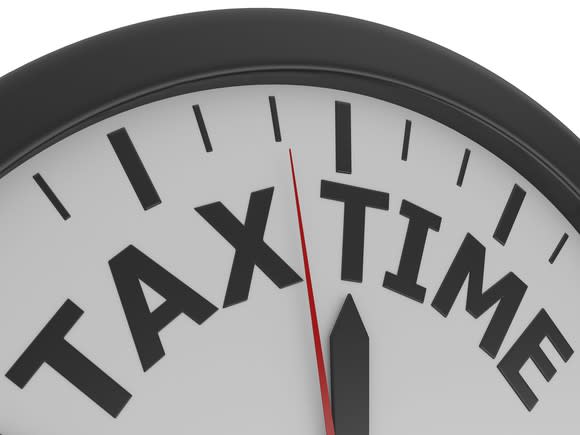What's the Deadline to File Taxes in 2018?
Taxes have certainly been hogging the news lately, especially in light of the recent changes that were implemented for 2018. But before we focus our attention toward the current year's taxes, let's not forget the little matter of tackling our 2017 returns. As you're probably aware, those returns are due in mid-April, though their exact due date might surprise you.
Without further ado, the deadline to file a return for the 2017 tax year is April 17, 2018. Why not April 15, as usual? Because when the 15th falls on a Sunday, the due date for returns is pushed to the following Monday. But since that Monday is Emancipation Day, a legal holiday in Washington, D.C., the rest of the country gets an extra 24 hours of leeway.
That said, the IRS will begin accepting returns as early as January 29, so it pays to get your taxes in ahead of schedule. Doing so will help you avoid late-payment penalties if you owe money, and will also push up your refund date if the IRS owes you a chunk of cash.

IMAGE SOURCE: GETTY IMAGES.
Get a head start on your 2017 taxes
Each year, countless tax filers wait until the very last minute to start tackling their returns -- so don't be one of them this time around. Now that you're aware of the April 17 deadline, you can take steps to gather your paperwork and receipts so that you're prepared to file your return ahead of schedule.
What sort of information will you need to file your taxes? If you're a salaried worker, you'll need your W-2, which summarizes your wages and tax payments for the year. If you're self-employed, you'll need a 1099 from each company you worked for. Keep in mind that the requirement to issue a 1099 is waived for earnings under $600, so if you did small projects for a number of clients, you may not get anything in the mail -- but you're still obligated to report those earnings, nonetheless.
In addition to the aforementioned forms, it also pays to gather information on the following well in advance of the April 17 deadline:
Interest income, dividend income, or capital gains you received in 2017.
Mortgage interest you paid last year.
Retirement plan contributions you made.
Healthcare costs you incurred.
Money or goods you donated to charity.
Childcare expenses you paid.
Whether you choose to itemize or claim the standard deduction on your 2017 taxes, you'll need to report all investment income on your return. Furthermore, most of the above-listed data will be essential if you're looking to itemize, so the more time you give yourself to compile it, the easier it will be to file your taxes.
Don't procrastinate
Though April 17 might seem pretty far away, the tax-filing deadline has a way of sneaking up on people. And that could hurt you in a number of ways.
First, if you don't leave yourself enough time to complete your return, you risk submitting one laden with errors. If this happens, your return might get audited, or outright rejected, and neither scenario is what you want.
Furthermore, if you find that you've underpaid your taxes for 2017, and therefore owe the IRS money, you could end up scrambling to come up with that cash if you wait until the last minute. Imagine you complete your return and realize you're staring at a $1,200 tax bill. If you come upon that information on or around April 17 and don't have the money in savings to cover that obligation, you'll face late-payment penalties that can quickly add up. On the other hand, if you realize in, say, mid-February that you're looking at an underpayment, you'll have two solid months to scrounge up that cash, whether in the form of taking on extra shifts at work, or signing up for some freelance projects to cover your shortfall.
Another good reason not to procrastinate? If you're due a refund, waiting until the last minute will only delay your cash. The IRS expects most refunds to go out within three weeks of receiving returns, provided you file electronically. Signing up for direct deposit could further expedite the process. This means that, in theory, you could be looking at your refund as early as February if you really get moving on your taxes. Wait until April 17, and you're more likely to get your cash in May.
That said, if you're claiming the Earned Income Tax Credit (EITC) or Additional Child Tax Credit on your return, the soonest you can expect your refund is late February. That's because the IRS is required to withhold refunds associated with these credits due to high levels of related fraud. But otherwise, the sooner you file, the sooner you can expect your cash.
Don't miss the boat
If, despite knowing the tax-filing deadline well in advance, you still find yourself unprepared come April 17 of this year, you have the option to request a tax extension, which will buy you an extra six months to complete your return. An extension, however, won't give you additional time to pay your tax bill if you owe money, so at the very least, you should have a rough estimate of what your return is going to look like by the time April 17 rolls around.
One final thing: Missing the April 17 deadline won't just subject you to a late-filing penalty, but will also needlessly drag out the already-stressful process of filing a return in the first place. You're better off getting your taxes over with in time and moving on with your life.
More From The Motley Fool
The Motley Fool has a disclosure policy.

 Yahoo Finance
Yahoo Finance 